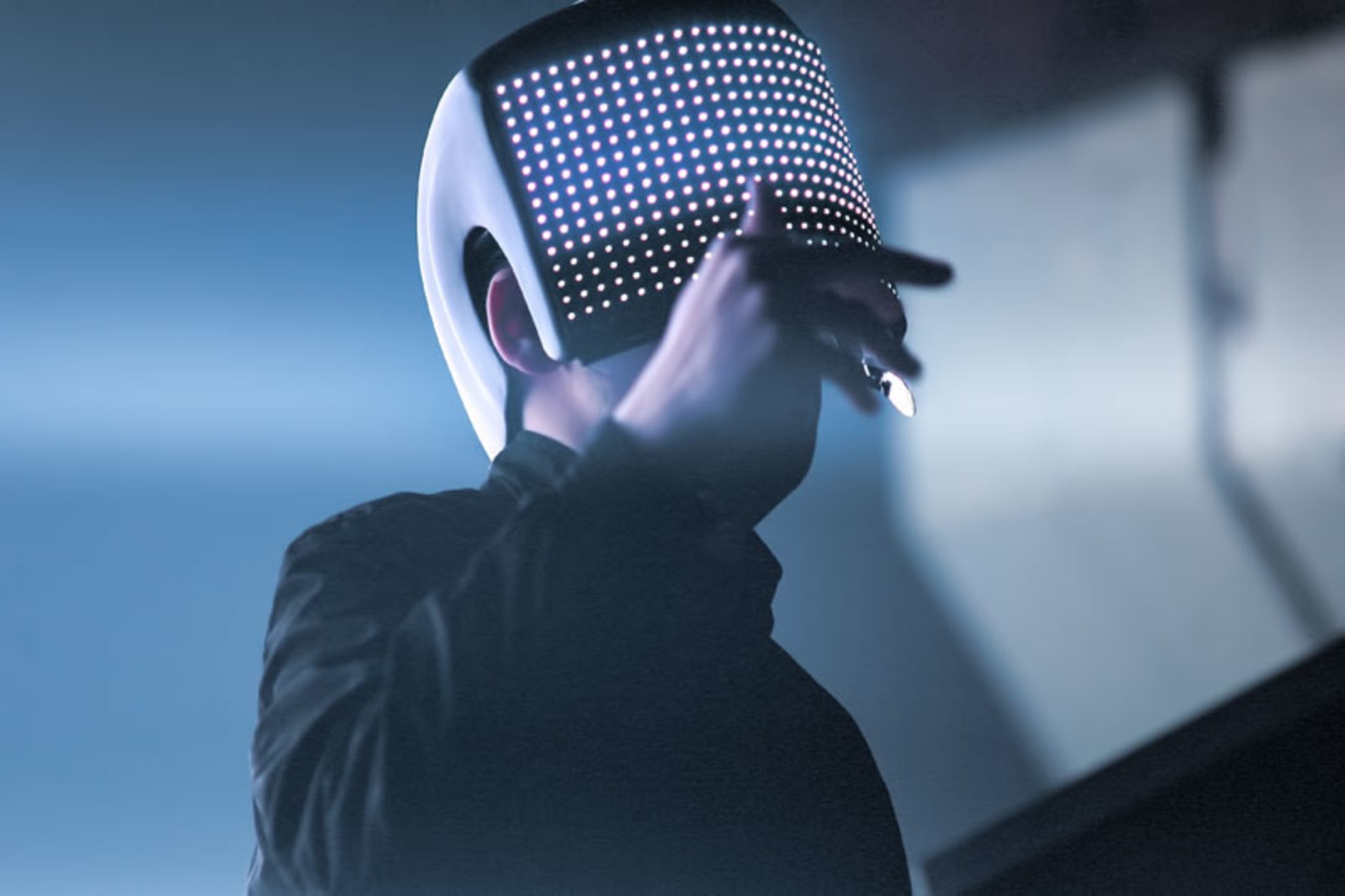
Electronic Beats Festival 2012: Gdansk Fever
“I try to borrow my music from the future” says Tom Jenkinson (aka Squarepusher) as he pours a glass of ice-cold San Pellegrino into his plastic cup.
He’s just finished his soundcheck and is now relaxing on a sofa, backstage of the old Gdansk U-Boot wharf—tonight the venue of the Electronic Beats festival in Gdansk, Poland. Only minutes ago, he was wearing a futuristic high-tech helmet with an impressive LED screen on it that made him look like the forgotten offspring of Daft Punk. Now he talks face to face with me about the French composer and organist Olivier Messiaen. His modern compositions could have theoretically been composed and played 500 years ago—on the same instrument. But nobody did it. Jenkinson’s goal is to anticipate what futuristic music could be played on his own equipment in 100 years. That’s what one could call ambitious, and nothing less is what the Gdansk audience gets to hear hours later in Squarepusher’s uncompromising prime-time set, including a stunning black and white LED visualization of his abstract breakbeats. But let’s start with the beginning
The sold-out kick-off of this year’s Electronic Beats festival season could be best described as eclectic and diverse. The first band to play was Warsaw’s Das Moon, an audiovisual group that was voted into the line-up by the Polish audience in an Internet contest. Das Moon, who credit Einstürzende Neubauten, Depeche Mode, Nico and Kraftwerk as their main inspirations delivered a dark and gothic opening set—while the audience was still slowly dropping in.
Next in line should have been Dillon and her band—the Brazilian-American singer/songwriter is also on the cover of the spring issue of the Electronic Beats Magazine. But as her luggage got unfortunately lost at Munich airport, she had to wait and wait and wait for the suitcase containing her laptop—which didn’t arrive.
As a result, Jazzanova played earlier than scheduled. They were the first highlight of the evening. The group delivered a tight and funky set that kicked no less than ass. In Poland, the Berlin-based collective of musicians is well-known for its groundbreaking CD compilation Go Right: Jazz From Poland 1963-75 that reportedly reminded a young generation of Polish jazz aficionados of their own musical heritage. The U-Boot wharf was by now already packed, and the audience cheered to the complex mixture of electronic sounds and real instrumental craftsmanship—among the numerous musicians were a trombone player, a saxophone player and a percussionist.
After Squarepusher’s substantial set, Digitalism entered the stage. The Hamburg duo performed in a waft of dry ice, pushing their bouncing Kitsuné sound to the limits. One word about the fact that the Gdansk festival got streamed live. It was fascinating to see Digitalism’s live set from a computer screen backstage and to hear their music life from next door. The US-American hacker ethicist Steven Levy recently described the format of the live-stream as the future of music. At the Electronic Beats festival, a lot of people were working behind the scenes to make the live-stream happen.
Unexpected for many, late at night Dillon entered the stage to perform a solo show in spite of her luggage that hadn’t arrived yet. The show could have been a triumph, considering that many of music history’s great and defining moments were born out of accidents. But Dillon’s performance suffered from the difficult situation she found herself in. The people in the audience loved it, though. Dillon sang only five songs on one of James Blake‘s many top-notch keyboards, but she delivered them in an intimate way, relying totally on her strong and impressive voice. Some concert-goers were irritated: “Was the lonely woman on the stage surrounded by dry ice Soap and Skin?” No, it wasn’t. It just wasn’t her day.
Following this special performance, James Blake hit the stage. The British shooting star delivered the highlight of the evening, playing his songs in a very laid-back way. Heavy subsonic basses and equally heavy experimentation with his voice defined a sound architecture that was nothing less than breathtaking. Blake really risked a lot by playing a slow and complex finishing set. But he succeeded. Sometimes the melodies brought the reminiscence of amusement park music to mind. But more important than that, James Blake seemed to be equally interested in defining the future as Squarepusher. He deliberately took away dramaturgic elements from his music to have a skeleton-like sound architecture.
The Electronic Beats festival in Gdansk was equally diverse and exotic.
Next up: Electronic Beats Festival Prague on 5th May 2012.
________
Photos: © Adam Burakowski / Lukasz Jasza / t-mobile-music.pl.
Published April 29, 2012. Words by Max Dax.
